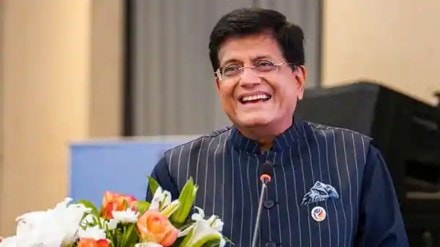The new bonhomie in relations with China is not driven by the recent developments in world trade, and the investments from the northern neighbour would be approved if that aligns with India’s vision for technology and supply chain integration, commerce and industry minister Piyush Goyal said on Friday.
Addressing an event organised by The Economic Times, Goyal said that the process that has been laid down for approval of Chinese investments in 2020 would continue, ruling out any changes in the Press Note 3 that put an additional layer of scrutiny (government approval) on foreign direct investment from countries sharing land borders with India.
He, however, added that the Press Note 3 does not ban FDI from anywhere but was issued to protect opportunistic takeover of Indian companies as valuations fell sharply following the pandemic that struck the world in 2020. “We only take a cautious approach and there (are) free approvals,” he added.
Not a trade-driven thaw in geopolitical relations
The minister’s comments come in the wake of reports that the approval process for FDI from China has gathered pace in recent months, particularly since the US has raised tariffs for most countries. India has turned out to be one of the most affected among major economies from the US’s highly protectionist stance.
Goyal hasn’t acknowledged any deliberate policy shift with regard to FDI approvals for China.
He said that increased engagement with China started after both countries reached an agreement on important border issues. The pause in the relationship was due to the situation after the clashes in Galwan valley. Earlier this week Chinese Foreign Minister Wang Yi visited India, which led to China agreeing to re-start exports of rare earth minerals, fertilisers and earth boring machines to India.
“Post Press Note 3, we have given approval to many companies. Wherever we find that the industry, technology or supply chain in question aligns with the vision of India, (those applications) have been regularly given approvals. The same process will continue in the future,” Goyal said. “When times change, situations change, then decisions can be made to suit the times,” he said.
Prime Minister Narendra Modi will be in China from August 31 to September 1 where he will be attending the summit of the Shanghai Cooperation Organisation. During the visit there Modi will also meet Chinese President XI Jinping.
On the 25% additional punitive tariffs on India’s exports to the US to kick in from August 27 and whether it worries him, the minister said, “We have alternatives. We are working on several alternatives. I am super confident that this year will be better than last year (on the export front).”
He said that the India-US relationship is important for both countries and engagement continues at many levels. “I have been engaged with the industry in India. I have been engaged with companies from the US working in India.”
Confident amidst U.S. tariff pressure
On the free trade agreements that India is negotiating, the minister said the progress in talks with the European Union has been rapid and it is very much doable in 2025, the deadline set earlier this year. He said that the agreement with New Zealand will be concluded in the next couple of months while the deal with Oman will be done next month. Engagements continue with Chile, Peru and Eurasian Economic Union (EAEU).
“India is looking at the entire situation very strategically. We are not reacting to the situation. We are proactively working with trade partners to expand business,” Goyal said.
Press Note 3 followed a directive issued by the Securities and Exchange Board of India (SEBI) where it had sought details of FPI investments from China as well as Hong Kong from custodians. Prior to issuance of PN 3, Chinese investments were under the automatic route, except for in sensitive areas like telecom, defence and national security etc.
Between April 2000 and March 2025, Chinese investment in India amounted to just $2.5 billion, or 0.3% of total FDI inflows into the country, even as New Delhi’s trade deficit with China is close to $100 billion now.
